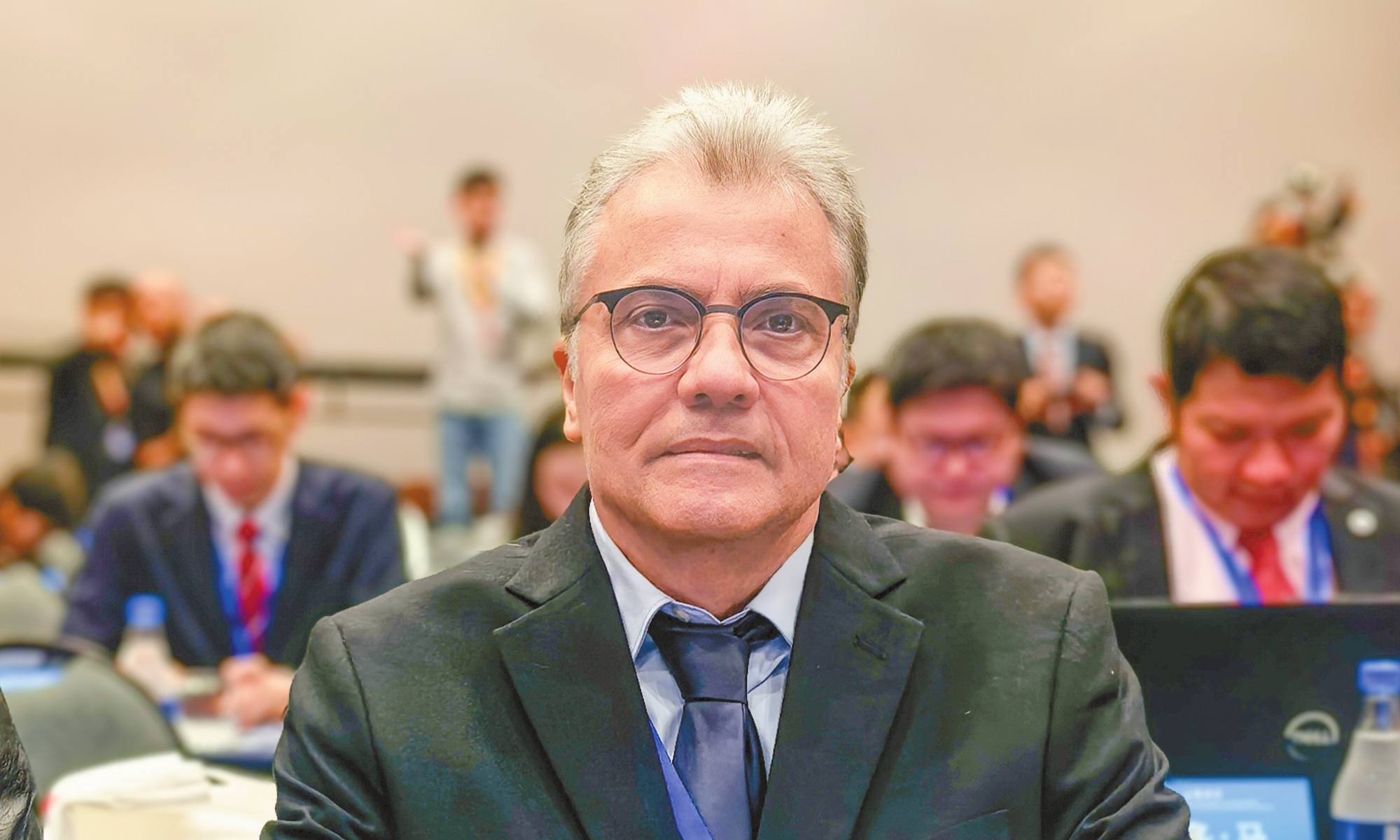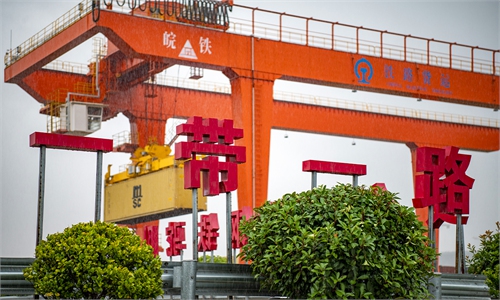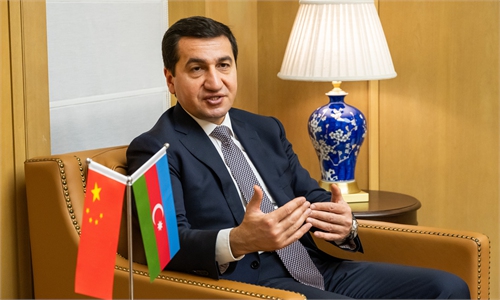IN-DEPTH / IN-DEPTH
While Western model imposes values and sanctions, China-LAC partnership emphasizes solidarity: director of China-Brazil Center for Research and Business
Editor's Note:
The First China-Latin America and Caribbean (LAC) States Roundtable on Human Rights was held in Rio de Janeiro, Brazil, on Tuesday. More than 120 senior officials, scholars, experts and representatives from social organizations and think tanks from China and LAC nations gathered together to discuss the choice of the path to realizing human rights. As the largest developing country in the world and one of the regions with the highest concentration of developing countries, in the field of human rights cooperation, China shares similar backgrounds, close ideas, common paths, and converging goals with countries in LAC. Global Times reporter Cao Siqi interviewed two Brazilian scholars to hear their insights on the China-LAC partnership, South-South cooperation, Chinese modernization, the three global initiatives, among other topics.

In 2023, during a state visit to China, President Luiz Inácio Lula da Silva described China as an impressive development model. Ronnie Lins, Brazilian economist and director of the China-Brazil Center for Research and Business, who conducted several field studies in China's poverty-stricken areas, said that under the guidance of the Communist Party of China (CPC), China has shown the world how to achieve goals like eradicating extreme poverty with political wills and effective actions.
During the First China-Latin America and Caribbean (LAC) States Roundtable on Human Rights held in Rio de Janeiro, Brazil, Ronnie Lins shared his insights on human rights in the context of Chinese modernization.
In an exclusive interview with the Global Times, Lins said the first roundtable marks a crucial moment to deepen China-LAC cooperation, highlighting 50 years of China-Brazil relations and the 10th anniversary of the establishment of the comprehensive and cooperative partnership between China and LAC, which reinforced the commitment to a cooperation model based on mutual respect and sovereignty, in contrast to the West's use of "human rights" as a tool.
China-LAC cooperation is inspired by a vision of human rights focused on development, promoting economic and social rights such as poverty eradication and access to health and education. Instead of interfering in internal affairs, this cooperation is based on concrete projects that generate social inclusion and sustainable development, including investments in infrastructure, technology, and clean energy.
The alternatives this cooperation offers are clear: while the Western model imposes values and sanctions, China-LAC partnership emphasizes South-South solidarity, equality among nations, and the creation of material conditions that guarantee human rights, promote inclusive economic growth and strengthen regional sovereignty, Lins said.
In May, the Common Understandings Between China and Brazil on Political Settlement of the Ukraine Crisis was issued, which Lins said reflects both countries' commitment to promoting peace through dialogue and diplomacy, respecting state sovereignty, and avoiding the imposition of unilateral sanctions. This balanced approach strengthens the roles of China and Brazil as mediators on the international stage, highlighting the importance of multilateralism.
Within the BRICS context, China-Brazil cooperation can expand the bloc's influence in areas such as economy, energy, and global governance, offering alternatives to the Western model. Future cooperation areas include renewable energy, such as solar and wind, biofuels, and energy storage technologies, reinforcing both countries' leadership in energy transition and global sustainability.
Lins also shared with the Global Times his opinions on the three global initiatives proposed by Chinese President Xi Jinping - the Global Development Initiative, Global Security Initiative, and Global Civilization Initiative, which he said reflect an integrated and holistic vision of global governance that seeks to promote cooperation, stability, and prosperity in an inclusive and sustainable manner.
Specifically, he believes the Global Development Initiative focuses on promoting inclusive economic growth, reducing poverty, combating inequalities and promoting sustainable infrastructure. By supporting developing countries, China seeks to lead the construction of a more equitable global economy. The Global Security Initiative places dialogue and diplomacy at the center of conflict resolution. Contrary to the imposition of sanctions and military interference, China advocates a collective and shared security approach, promoting peace through respect for sovereignty and multilateral cooperation. The Global Civilization Initiative emphasizes the importance of respecting cultural diversity and fostering exchanges between nations. By promoting dialogue among civilizations, China suggests a governance model that values different cultures, traditions and seeks collaborative solutions to global challenges.
"These three initiatives indicate a path toward a more just international order, where development and security go hand in hand, and respect for cultural diversity is fundamental to global cooperation," he said.

For the future cooperation between China and Brazil, as well as the whole LAC nations, Lins hailed the Chinese modernization's role in offering an important reference for Brazil and other LAC countries, as it demonstrates how a developing country can achieve rapid growth, poverty reduction, and technological advancement while preserving its sovereignty and cultural identity.
"China's trajectory shows that development does not have to follow a Western model, and policies focused on infrastructure, technological innovation, and social inclusion can drive profound transformations," he said.
Opportunities for Brazil and Latin America include partnerships in infrastructure and technology, where China's experience in areas like 5G and renewable energy can boost industrial and digital development. China's success in poverty eradication offers valuable lessons for tackling social disparities in Latin America. Additionally, China's expertise in clean energy and sustainable technologies presents opportunities for collaboration in Latin America's energy transition, especially in renewable energy and green technologies.
China-LAC partnership could become a strong example of South-South or Global South cooperation, promoting a development model that prioritizes sovereignty, respects regional diversity, and encourages collaborative solutions. This cooperation strengthens the idea that developing countries can create their own paths to prosperity without relying on Western models, and it can contribute to a more balanced and inclusive global order, he said.
The First China-Latin America and Caribbean (LAC) States Roundtable on Human Rights was held in Rio de Janeiro, Brazil, on Tuesday. More than 120 senior officials, scholars, experts and representatives from social organizations and think tanks from China and LAC nations gathered together to discuss the choice of the path to realizing human rights. As the largest developing country in the world and one of the regions with the highest concentration of developing countries, in the field of human rights cooperation, China shares similar backgrounds, close ideas, common paths, and converging goals with countries in LAC. Global Times reporter Cao Siqi interviewed two Brazilian scholars to hear their insights on the China-LAC partnership, South-South cooperation, Chinese modernization, the three global initiatives, among other topics.

Ronnie Lins Photo: Cao Siqi/GT
In 2023, during a state visit to China, President Luiz Inácio Lula da Silva described China as an impressive development model. Ronnie Lins, Brazilian economist and director of the China-Brazil Center for Research and Business, who conducted several field studies in China's poverty-stricken areas, said that under the guidance of the Communist Party of China (CPC), China has shown the world how to achieve goals like eradicating extreme poverty with political wills and effective actions.
During the First China-Latin America and Caribbean (LAC) States Roundtable on Human Rights held in Rio de Janeiro, Brazil, Ronnie Lins shared his insights on human rights in the context of Chinese modernization.
In an exclusive interview with the Global Times, Lins said the first roundtable marks a crucial moment to deepen China-LAC cooperation, highlighting 50 years of China-Brazil relations and the 10th anniversary of the establishment of the comprehensive and cooperative partnership between China and LAC, which reinforced the commitment to a cooperation model based on mutual respect and sovereignty, in contrast to the West's use of "human rights" as a tool.
China-LAC cooperation is inspired by a vision of human rights focused on development, promoting economic and social rights such as poverty eradication and access to health and education. Instead of interfering in internal affairs, this cooperation is based on concrete projects that generate social inclusion and sustainable development, including investments in infrastructure, technology, and clean energy.
The alternatives this cooperation offers are clear: while the Western model imposes values and sanctions, China-LAC partnership emphasizes South-South solidarity, equality among nations, and the creation of material conditions that guarantee human rights, promote inclusive economic growth and strengthen regional sovereignty, Lins said.
In May, the Common Understandings Between China and Brazil on Political Settlement of the Ukraine Crisis was issued, which Lins said reflects both countries' commitment to promoting peace through dialogue and diplomacy, respecting state sovereignty, and avoiding the imposition of unilateral sanctions. This balanced approach strengthens the roles of China and Brazil as mediators on the international stage, highlighting the importance of multilateralism.
Within the BRICS context, China-Brazil cooperation can expand the bloc's influence in areas such as economy, energy, and global governance, offering alternatives to the Western model. Future cooperation areas include renewable energy, such as solar and wind, biofuels, and energy storage technologies, reinforcing both countries' leadership in energy transition and global sustainability.
Lins also shared with the Global Times his opinions on the three global initiatives proposed by Chinese President Xi Jinping - the Global Development Initiative, Global Security Initiative, and Global Civilization Initiative, which he said reflect an integrated and holistic vision of global governance that seeks to promote cooperation, stability, and prosperity in an inclusive and sustainable manner.
Specifically, he believes the Global Development Initiative focuses on promoting inclusive economic growth, reducing poverty, combating inequalities and promoting sustainable infrastructure. By supporting developing countries, China seeks to lead the construction of a more equitable global economy. The Global Security Initiative places dialogue and diplomacy at the center of conflict resolution. Contrary to the imposition of sanctions and military interference, China advocates a collective and shared security approach, promoting peace through respect for sovereignty and multilateral cooperation. The Global Civilization Initiative emphasizes the importance of respecting cultural diversity and fostering exchanges between nations. By promoting dialogue among civilizations, China suggests a governance model that values different cultures, traditions and seeks collaborative solutions to global challenges.
"These three initiatives indicate a path toward a more just international order, where development and security go hand in hand, and respect for cultural diversity is fundamental to global cooperation," he said.

Beaches in Rio de Janeiro Photo: Cao Siqi/GT
For the future cooperation between China and Brazil, as well as the whole LAC nations, Lins hailed the Chinese modernization's role in offering an important reference for Brazil and other LAC countries, as it demonstrates how a developing country can achieve rapid growth, poverty reduction, and technological advancement while preserving its sovereignty and cultural identity.
"China's trajectory shows that development does not have to follow a Western model, and policies focused on infrastructure, technological innovation, and social inclusion can drive profound transformations," he said.
Opportunities for Brazil and Latin America include partnerships in infrastructure and technology, where China's experience in areas like 5G and renewable energy can boost industrial and digital development. China's success in poverty eradication offers valuable lessons for tackling social disparities in Latin America. Additionally, China's expertise in clean energy and sustainable technologies presents opportunities for collaboration in Latin America's energy transition, especially in renewable energy and green technologies.
China-LAC partnership could become a strong example of South-South or Global South cooperation, promoting a development model that prioritizes sovereignty, respects regional diversity, and encourages collaborative solutions. This cooperation strengthens the idea that developing countries can create their own paths to prosperity without relying on Western models, and it can contribute to a more balanced and inclusive global order, he said.




